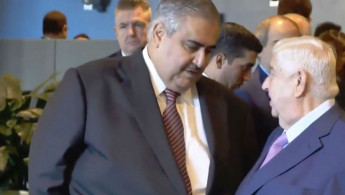Bahrain, Syria regime foreign ministers hug, kiss at UN
An amicable meeting between Bahrain's foreign minister and his counterpart from the Syrian regime at the United Nations has prompted Manama to defend the "unplanned" encounter.
Khalid bin Ahmed al-Khalifa was filmed embracing and kissing Walid al-Muallem at the UN General Assembly on Saturday.
Saudi-funded Al-Arabiya published footage of the meeting and said, citing an named source, that it was "part of efforts to revive the Arab role in resolving the Syrian crisis".
The meeting comes as a surprise as the Bahraini regime has long opposed the regime of Syria President Bashar al-Assad and has severed ties with his close ally Iran.
Khalifa defended the meeting in an interview with Al-Arabiya on Sunday, saying it was "unplanned" and not the first time the two have met since the beginning of the Syrian conflict.
"The meeting comes at a time when there are serious efforts to revive the role of Arabs in the Syrian crisis," Khalifa said.
"Syria is a brotherly, Arab nation and what happens there concerns us more than anywhere else in the world. It is not right that regional and international players are involved in Syria while we are absent,"
"We think the state must take back control of the whole country and secure it," he added.
The comments stand in contrast to previous threats from Bahrain to send ground troops to Syria, prompting Muallem to warn that the soldiers would "return home in coffins".
Bahrain has also expressed support for Israeli airstrikes on Iranian military targets in Syria.
Khalifa said during his speech at the UN General Assembly this week that Bahrain backs efforts to "expel Iranian militias" from Syria.
Gulf states like Bahrain, Saudi Arabia and the UAE have been accused of abandoning the Syrian opposition in favour of curbing the influence of their rival Iran in Syria.





 Follow the Middle East's top stories in English at The New Arab on Google News
Follow the Middle East's top stories in English at The New Arab on Google News
![The UAE is widely suspected of arming the RSF militia [Getty]](/sites/default/files/styles/image_330x185/public/2024-11/GettyImages-472529908.jpg?h=69f2b9d0&itok=Yauw3YTG)
![Netanyahu furiously denounced the ICC [Getty]](/sites/default/files/styles/image_330x185/public/2024-11/GettyImages-2169352575.jpg?h=199d8c1f&itok=-vRiruf5)
![Both Hamas and the Palestinian Authority welcomed the ICC arrest warrants [Getty]](/sites/default/files/styles/image_330x185/public/2024-11/GettyImages-2178351173.jpg?h=199d8c1f&itok=TV858iVg)